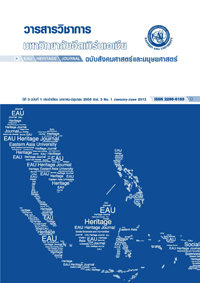การวิเคราะห์ปัจจัยที่มีอิทธิพลต่อการนำนโยบายโรงเรียนคุณภาพมาตรฐานกรุงเทพมหานคร ไปปฏิบัติในสถานศึกษาขั้นพื้นฐานสังกัดกรุงเทพมหานคร
Keywords:
ปัจจัยนโยบาย, โรงเรียนคุณภาพมาตรฐาน, ผลการนำนโยบายไปปฏิบัติ, สถานศึกษาขั้นพื้นฐาน, policy factors, performance of policy implementation, education quality assurance, basic education schoolsAbstract
การวิจัยเชิงปริมาณนี้มีวัตถุประสงค์เพื่อการวิเคราะห์ปัจจัยที่มีอิทธิพลต่อผลการนำนโยบายโรงเรียน คุณภาพมาตรฐานกรุงเทพมหานครไปปฏิบัติในสถานศึกษาขั้นพื้นฐานสังกัดกรุงเทพมหานคร กลุ่มตัวอย่าง ประกอบด้วย บุคลากร และคณะกรรมการสถานศึกษาขั้นพื้นฐาน จำนวน 1,000 คน จาก 181 โรงเรียน ซึ่งเป็น หน่วยเลือกกลุ่มตัวอย่างแบบเจาะจง เครื่องมือที่ใช้เป็นแบบสอบถาม สถิติที่ใช้ในการวิเคราะห์และนำเสนอข้อมูล ได้แก่ ค่าเฉลี่ย ความเบี่ยงเบนมาตรฐาน การวิเคราะห์พหุคูณถดถอย และการวิเคราะห์เส้นทางแบบมีตัวแปรแฝงด้วย โปรแกรมลิสเรล
ผลการวิจัยปรากฎ ดังนี้ (1) ปัจจัยนโยบายด้านทรัพยากร และคุณลักษณะของหน่วยงานและผู้นำนโยบาย ไปปฏิบัติไม่มีความสัมพันธ์กับผลการปฏิบัติตามนโยบายโรงเรียนคุณภาพมาตรฐานในเชิงทฤษฎี แต่ปัจจัยด้าน มาตรฐานนโยบาย เงื่อนไขทางเศรษฐกิจและสังคม เงื่อนไขทางการเมือง และทัศนคติของผู้นำนโยบายไปปฏิบัติ มีความสัมพันธ์และสามารถพยากรณ์ผลการปฏิบัติตามนโยบายโรงเรียนคุณภาพมาตรฐานกรุงเทพมหานคร ได้ร้อยละ 79 (2) ผลการปฏิบัติตามนโยบายโรงเรียนคุณภาพมาตรฐานกรุงเทพมหานครได้รับอิทธิพลทางตรง อย่างมีนัยสำคัญทางสถิติจากปัจจัยทัศนคติของผู้นำนโยบายไปปฏิบัติคุณลักษณะของหน่วยงานและผู้นำนโยบาย ไปปฏิบัติ และมาตรฐานนโยบาย ส่วนเงื่อนไขทางการเมือง เงื่อนไขทางเศรษฐกิจและสังคม และทรัพยากรนโยบาย มีอิทธิพลต่อผลการปฏิบัติตามนโยบายโรงเรียนคุณภาพมาตรฐานกรุงเทพมหานคร โดยอ้อมผ่านปัจจัยนโยบายอื่น
The Analysis of Factors Affecting the SMART SCHOOL Policy Implementation in Basic Education Schools under the Bangkok Metropolitan Administration
The main objective of this causal-effect quantitative research was to analyze the relationship between the policy factors and the performance of SMART SCHOOL policy implementation in schools under the Bangkok Metropolitan Administration. The sample consisted of 1,000 school personnel and school committee members purposely selected from 181 basic education schools in the Greater Bangkok Metropolis. The tool used for data collection was a set of five-rating scale questionnaire and the statistical methods used were mean, standard deviation, multiple regression analysis, and path analysis with latent variables using the Linear Structure Relationship Program (LISREL). Findings revealed that: (1) The policy resources, the characteristics of the policy units and the capability of the policy implementer had no influence theoretically on the performance of the policy implementation; however, the policy standards, the socio-economic factors, the political factors, and the attitude of the policy implementer were related to and could predict approximately 79 percent of the performance of SMART SCHOOL policy implementation. (2) The performance of SMART SCHOOL policy implementation was directly influenced by the attitude and capacity of the policy implementer, the characteristics of the policy units and the policy standards while the political factors, the socio-economic factors, and th e policy resources had indirect influence.



